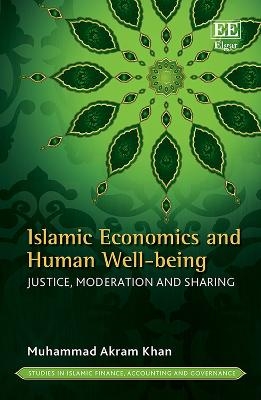
Islamic Economics and Human Well-being
Justice, Moderation and Sharing
Seiten
2024
Edward Elgar Publishing Ltd (Verlag)
978-1-0353-3368-4 (ISBN)
Edward Elgar Publishing Ltd (Verlag)
978-1-0353-3368-4 (ISBN)
The study of Islamic economics provides an interesting complement to conventional economics as they both study economic behaviour to enhance human well-being. Muhammad Akram Khan articulates an expert view on how to use distinct approaches to achieve this in the context of Islamic economics.
In this comprehensive book, Akram Khan not only illustrates the empirical evidence found in traditional economics but also explores the divine revelation found in the Qur’an and the traditions of the Prophet Muhammad. Highlighting the five dimensions of Islamic justice, namely equality, accountability, reciprocity, fairness and empowering the weak, the book emphasises moderation in the creation and consumption of wealth and outlines a plan for sharing resources with those in need. It goes a step further from material well-being to demonstrate how enhancing human happiness is the goal for a modern society.
This visionary read will be an excellent resource for academics involved in teaching, researching, and writing on Islamic economics. It will also be of great benefit to policy makers and economic managers in Muslim and Western countries who would like to focus on social and economic justice in their societies.
In this comprehensive book, Akram Khan not only illustrates the empirical evidence found in traditional economics but also explores the divine revelation found in the Qur’an and the traditions of the Prophet Muhammad. Highlighting the five dimensions of Islamic justice, namely equality, accountability, reciprocity, fairness and empowering the weak, the book emphasises moderation in the creation and consumption of wealth and outlines a plan for sharing resources with those in need. It goes a step further from material well-being to demonstrate how enhancing human happiness is the goal for a modern society.
This visionary read will be an excellent resource for academics involved in teaching, researching, and writing on Islamic economics. It will also be of great benefit to policy makers and economic managers in Muslim and Western countries who would like to focus on social and economic justice in their societies.
Muhammad Akram Khan, Former Deputy Auditor General of Pakistan (until 2003) and Chief Resident Auditor, UN Peacekeeping Missions (2003–2007)
Contents:
Preface
1 Islamic economics: a brief introduction
2 Justice in the Qur’an
3 Justice in economics: an Islamic perspective
4 Justice in finance: prohibition of Riba
5 Investment decisions and social justice
6 Moderation and consumer behaviour
7 Ethical behaviour and material well-being
8 Towards a just society
9 Conclusion to Islamic Economics and Human Well-being
References
| Erscheinungsdatum | 23.05.2024 |
|---|---|
| Reihe/Serie | Studies in Islamic Finance, Accounting and Governance series |
| Verlagsort | Cheltenham |
| Sprache | englisch |
| Maße | 156 x 234 mm |
| Themenwelt | Geisteswissenschaften ► Religion / Theologie ► Islam |
| Recht / Steuern ► Allgemeines / Lexika | |
| Recht / Steuern ► EU / Internationales Recht | |
| Sozialwissenschaften ► Soziologie ► Spezielle Soziologien | |
| Wirtschaft ► Betriebswirtschaft / Management ► Finanzierung | |
| ISBN-10 | 1-0353-3368-6 / 1035333686 |
| ISBN-13 | 978-1-0353-3368-4 / 9781035333684 |
| Zustand | Neuware |
| Haben Sie eine Frage zum Produkt? |
Mehr entdecken
aus dem Bereich
aus dem Bereich


